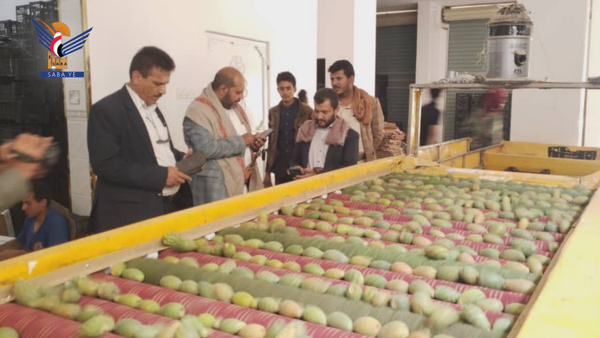
Sana'a - Saba:
Faris Al-Kahali, the Deputy Governor of Sana’a for Services Sector, inspected the workflow at Al-Fath Agricultural Production and Marketing Foundation.
Accompanied by Mahmoud Al-Hakimi, Deputy Head of the Agricultural Sector in the governorate, Al-Kahali received a briefing from the foundation’s director, Fath Al-Rahman Al-Jassar, on its operations and activities in the marketing and export of prickly pears. Al-Jassar noted that in recent years, the foundation has expanded to market and export other varieties of fruits.
He explained that the foundation’s process begins with purchasing prickly pear crops from farmers, transporting them to the facility, where the produce undergoes cleaning, sorting, and removal of defective items. The products are then properly stacked, packaged, and transported to mobile refrigeration units before being exported and marketed abroad.
Al-Jassar highlighted that this year, the foundation successfully exported over 100 tons of prickly pears, more than 150 tons of assorted fruits, in addition to 30 tons of mangoes, 10 tons of custard apples (sugar apples), and 10 tons of local peaches.
He also addressed the challenges facing the foundation during export operations, including delays due to the blockade, the use of long and rugged alternative land routes, and congestion at border crossings—factors that sometimes lead to partial or complete spoilage of the products.
The deputy governor praised the foundation’s management and its role in supporting Yemeni farmers and producers, particularly amid the ongoing aggression and blockade.
He called on investors to capitalize on the promising future of the agricultural sector, especially given the expansion of farmland and the successful cultivation of diverse crops.
Faris Al-Kahali, the Deputy Governor of Sana’a for Services Sector, inspected the workflow at Al-Fath Agricultural Production and Marketing Foundation.
Accompanied by Mahmoud Al-Hakimi, Deputy Head of the Agricultural Sector in the governorate, Al-Kahali received a briefing from the foundation’s director, Fath Al-Rahman Al-Jassar, on its operations and activities in the marketing and export of prickly pears. Al-Jassar noted that in recent years, the foundation has expanded to market and export other varieties of fruits.
He explained that the foundation’s process begins with purchasing prickly pear crops from farmers, transporting them to the facility, where the produce undergoes cleaning, sorting, and removal of defective items. The products are then properly stacked, packaged, and transported to mobile refrigeration units before being exported and marketed abroad.
Al-Jassar highlighted that this year, the foundation successfully exported over 100 tons of prickly pears, more than 150 tons of assorted fruits, in addition to 30 tons of mangoes, 10 tons of custard apples (sugar apples), and 10 tons of local peaches.
He also addressed the challenges facing the foundation during export operations, including delays due to the blockade, the use of long and rugged alternative land routes, and congestion at border crossings—factors that sometimes lead to partial or complete spoilage of the products.
The deputy governor praised the foundation’s management and its role in supporting Yemeni farmers and producers, particularly amid the ongoing aggression and blockade.
He called on investors to capitalize on the promising future of the agricultural sector, especially given the expansion of farmland and the successful cultivation of diverse crops.